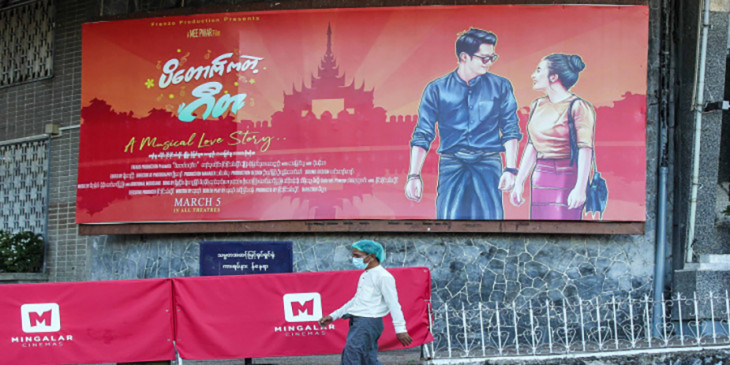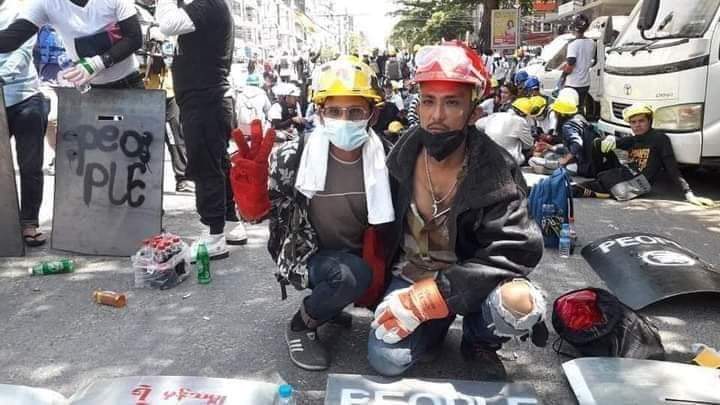After a two year hiatus, Burma’s military junta says it is to reopen cinemas on April 17, new year’s day in the Burmese calender.
The move comes as the coup government’s Ministry of Information looks to consolidate its control over the country’s eviscerated entertainment sector, having annihilated an arts scene that had blossomed since 2012.
Screens are to be switched back on shortly after the State Administrative Council (SAC) released a number of leading stars arrested for protesting the coup — all of whom are set to star in a roster of films carefully curated by the military for the reopening.
Cinema owners and film production companies that spoke to DVB reported being coerced to present their movies.
“Our production house only has two movies to show. I bet we will lose money if cinemas reopen, especially in this situation where nobody will want to attend,” said one filmmaker who spoke on guarantee of anonymity. “There are so many negative things that I am unable to say — many cinema owners and producers have recently received loans from [the junta]. [The military] will do everything they can to present as if things are back to normal, but actually they are not.”
Industry heads were threatened by authorities and pressured to release their work to cinemas during a meeting at the Myanmar Motion Picture Organization hosted by the military’s Ministry of Information on February 10, sources from within the film industry told DVB.
During the meeting, the ministry is reported to have said that it would prioritize screening the work of cast and crew who failed to oppose the coup, and that it would “review” the movies of those who participated in protests.
“I don’t think anyone will dare go to cinemas; no one can stay cool and happy during a time when people are suffering. The audience will be divided between those who are conscious of what is happening, and those who are not,” cinema-goer Kyi Lae Hnin told DVB.
The arrival of COVID-19 in March 2020 shuttered production houses who, almost a year later, were hit with the existential disaster of the coup. With the military’s addition of its now notorious Sec. 505(a) to the country’s Penal Code, freedom of expression was removed in an instant, forcing many artists working within the industry underground.
Some of the country’s leading stars took to the streets in protest or published thoughts critical of the military on social media accounts, leading to arrest and, for some, imprisonment. Over a three month period, the military broadcast the faces of over 120 celebrities it planned to arrest.
Amongst them was internationally known actor and model, Paing Takhon, who was arrested by eight trucks of soldiers in April. The heartthrob had published video footage of himself participating in a large Yangon rally in which protestors threw colorful smoke bombs at armed members of the security forces.

In early March, after spending almost one year in detention — and, in December, being sentenced to three years in Insein Prison — Paing Takhon was “pardoned” as part of an amnesty which also included imprisoned husband and wife superstars Pyay Ti Oo and Eaindra Kyaw Zin and director Lu Min.
A list of six films put forward by the junta for release on April 17 suggests that the four freed stars will feature heavily in the reopening — causing unease amongst the public and adding fuel to the arguments of those who had speculated that the group had been released on condition of collaboration with the military’s propaganda ministry.
“As we speculated, the most influential people got released after three months of their sentences and are back in shoots; of course, they have to — they can’t leave the country. As the military has complete control over them, they will have to live under their watch despite being released,” a producer, who has left the country since the coup, told DVB.
“We realize that [the sentencing of celebrities] is just a distraction. All the sentences will get reduced… it takes [fans’] minds off of the actual situation [in the country]. That’s the oldest trick in the book — but it works every time.”
In a meeting held in Naypyidaw on March 24, The SAC’s Minister of Information, Maung Maung Ohn, said that that Min Aung Hlaing had passed a decree instructing officials “to take serious action” against private cinemas showing films which fail to adhere to “rules and regulations” laid out “at the SAC Management Committee Meeting (3/2021) held on 11 March 2021,” thereby explicitly declaring the military’s total oversight of cinema screenings.
Many believe the mooted reopening of Burma’s cinemas to be yet another transparent ruse; part of the military’s strategy of presenting a return to normality to the outside world whilst brutally pacifying urban populations and performing atrocities against those living outside of major cities. The majority of China’s state media outlets, quiet on the escalating massacres in the country’s northwest and southeast, chose to run stories of Burma’s cinema reopenings.
Other stars set to return to cinema screens are Ei Chaw Po, Nay Min, Aung Ye Lin, Khine Thin Kyi, and Wutt Hmone Shwe Yi. All remained silent as troops violently stemmed anti-coup demonstrations, yet Wutt Hmone Shwe Yi — formerly Burma’s best loved screen icon, whose cousin, actress Phway Phway, exiled after being added to the military’s 505(a) list — made a surprise return to social media following the March prison amnesty, further alienating her audience.
Many in Burma have expressed that they will continue to boycott work featuring those who have failed to speak up since the coup: a number of Burma’s celebrities have, inevitably, risen to fame due to their links to military-backed agencies — including 7th Sense Creation, a firm founded and controlled by Thiri Thet Mon, daughter of Min Aung Hlaing — and, as such, have moderated their criticisms of the military out of either fear or loyalty.
“I would appeal to the audiences that come to watch movies to stay safe. I’d like to say: please remember the celebrities and stars who were arrested by the junta,” urged the anonymous filmmaker who spoke to DVB.
Sentenced in December alongside the released was actor Ye Deight, a leading man born to a Muslim family who has long been the focus of suspicion from the Burmese military.
Ye Deight, also charged under Sec. 505(a), was arrested at Yangon’s Thamine Junction on April 3, 2021. Before disappearing from the news, the actor was reported to have fainted during a court hearing on Dec. 15, with his lawyer claiming that he was suffering from “brain atrophy”.
The star, who was previously charged with blasphemy (and accused by security forces of using drugs) after launching a bizarre protest inside of St. Mary’s Cathedral in June 2013, also faces charges under Sec. 16(c) of the Narcotic Drugs and Psychotropic Substances Law after intoxicants were alleged to be found in his possession during his arrest.
The military continues to hold a number of Burma’s celebrities, including singers Saw Phoe Kwar and Po Po, beauty blogger Win Min Than, director Min Htin Ko Ko Gyi, makeup artist Gucci Aung, comedian Sin Ma, and Ito, the musician son of rock megastar Zaw Win Htut.
It is not only actors whom the military is looking to co-opt into its propaganda push: Last October, the junta’s “Remedial Committee on the Economic Impacts of COVID-19” unveiled what it described as a K15 billion (US$8 million) “COVID-19 fund” to provide loans to firms operating in the entertainment industry.
Some of the country’s leading production companies; including Forever Group, Mingalar Co. Ltd, Royal Ace Mega, Fortune Media, Moon Myanmar Media, Paradiso Cinemas, Bo Bo Entertainment Myanmar, Sein Htay Film & Video Production, Khayay Phyu, Red Radiance Studio, Milky Way Media, and Shwe Pyi Sone Film Production; are said to have accepted the military’s handouts, with Eleven Media Group suggesting that 882 companies in total had been approved for the low interest (1%), one year loans. The loans are seen by many as a move to test loyalty, and to consolidate the junta’s propaganda machine.
As the SAC attempts to resuscitate Burma’s film industry from the destruction it has reaped, independent Burmese film makers are winning acclaim overseas. In February, Myanmar Diaries, a documentary about Burma’s Spring Revolution, won best picture at the Berlin Film Festival. The documentary, compiled by ten young Burmese filmmakers working under pseudonyms, follows youths whose hopes for the future are shattered as the coup progresses. In September, What Happened to the Wolf?, a story of two terminally ill female lovers, premiered at Germany’s Oldenburg Film Festival. Eaindra Kyaw Zin, then detained yet now reappearing on Burmese cinema screens, played the lead, her name adorned across the T-shirts of many in attendance.
According to local media reports, the first movie to hit screens in April will be Lu Min’s Way Ma Nay Chi Bu (or, I Don’t Want Us To Be Apart), starring Shwe Hmone Yati, a once popular young actress who failed to protest military atrocities and who, sources told DVB, has crony and military backers.
“[Industry actors] will be replaced by different faces, different management… Their businesses are already producing TV series’ and will be back on the big screen in no time. The entire industry will surely be monopolized by the same group of people with different front men and names, but it will never regain the potential to present to the international film industry that it had in 2018-19… it will never be the same,” the exiled producer told DVB.




